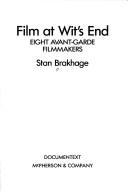| Listing 1 - 3 of 3 |
Sort by
|
Book
ISBN: 3825377962 3825356841 9783825356842 9783825377960 Year: 2018 Publisher: Heidelberg Universitätsverlag Winter
Abstract | Keywords | Export | Availability | Bookmark
 Loading...
Loading...Choose an application
- Reference Manager
- EndNote
- RefWorks (Direct export to RefWorks)
Drawing on grammatology, historical semantics and discourse theory, Temporality in American Filmic Autobiography treats automediality in semiotic materiality and transmediality as processuality and relationality of agency at an intersection of auto/biography studies, film studies and media studies, reviews concepts of time in philosophy, sociology, cinema studies and narratology, and applies critical vocabularies of temporality and temporalization in an extended analysis of two classics of 1970s American filmic autobiography, Film Portrait, by Jerome Hill and Joyce at 34, by Joyce Chopra and Claudia Weill. The study of film, time and self-processing develops the grammatology of cinema from contemporary positions on cinematic semiosis, temporality, and contingency, filmic and postfilmic cinema, documentary-style film, deixis across media, and the trace as critical vocabulary. Among supplementary tables, a chapter offers an overview of the canonization and transnationalization of cinematic autobiography in anglophone research.
Film adaptations. --- Adaptations, Film --- Books, Filmed --- Filmed books --- Films from books --- Literature --- Motion picture adaptations --- Motion pictures --- Film adaptations --- Adaptations --- Hill, Jerome,

ISBN: 0914232991 Year: 1992 Publisher: Kingston : McPherson & company,
Abstract | Keywords | Export | Availability | Bookmark
 Loading...
Loading...Choose an application
- Reference Manager
- EndNote
- RefWorks (Direct export to RefWorks)
Experimental films --- Motion picture producers and directors --- 791.43 --- Brakhage Stan --- Broughton James --- Conner Bruce --- Deren Maya --- experimentele film --- film --- Hill Jerome --- Jacobs Ken --- Maclaine Christopher --- Menken Marie --- Peterson Sidney --- Avant-garde films --- Experimental videos --- Personal films --- Underground films --- Motion pictures --- Video art --- Biography
Book
ISBN: 0691219559 Year: 1992 Publisher: Princeton, N.J. : Princeton University Press,
Abstract | Keywords | Export | Availability | Bookmark
 Loading...
Loading...Choose an application
- Reference Manager
- EndNote
- RefWorks (Direct export to RefWorks)
And Yoko Ono, and finally the critical assessment of his own films, from Guns of the Trees and The Brig in the sixties to the diary films that followed Walden. Film-distributor, and filmmaker, while exploring the history of independent cinema in New York since World War II. This collection of essays, interviews, and photographs addresses such topics as Mekas's column in the Village Voice, his foundation and editorship of Film Culture, his role in the establishment of Anthology Film Archives and The Film-Makers Co-op (the major distribution center for independent film), his interaction with other artists, including John Lennon. Jonas Mekas, one of the driving forces behind New York's alternative film culture from the 1950s through the 1980s, made for an unlikely counterculture hero: a Lithuanian emigre and fervent nationalist from an agrarian family, he had not grown up with either capitalist commercialism or the postwar rebellion against it. By focusing on his sensitivity to political struggle, however, leading film commentators here offer fascinating insights into Mekas's career as a writer.
Cinema underground --- Cinema --- Motion picture industry --- Experimental films --- Industrie --- Mekas, Jonas, --- Mekas, Jonas. --- Mekas, Jonas --- Critique et interpretation. --- Criticism and interpretation. --- USA. --- USA --- New York (State) --- Agee, James. --- Anger, Kenneth. --- Anthology Film Archives. --- Baillie, Bruce. --- Beat Generation. --- Brakhage, Stan. --- Cahiers du Cinéma. --- Cassavetes, John. --- Cinema. --- Deren, Maya. --- Emerson, Ralph Waldo. --- Film Culture. --- Foreman, Richard. --- Frank, Robert. --- Ginsberg, Allen. --- Grand Street (Jonas Mekas). --- Harrington, Curtis. --- Hill, Jerome. --- Hollywood film industry. --- Impressionism. --- Intro Bulletin. --- Jacobs, Ken. --- Kerouac, Jack. --- Kubelka, Peter. --- Lennon, John. --- Lithuania. --- Living Theater. --- Maas, Willard. --- Markopolous, Gregory. --- Mekas, Adolfas. --- New American Cinema. --- Ono, Yoko. --- Peterson, Sidney. --- Rice, Ron. --- Sarris, Andrew. --- Sitney, P. Adams. --- Thoreau, Henry David. --- Vietnam War. --- Welles, Orson. --- diary film. --- realism.
| Listing 1 - 3 of 3 |
Sort by
|

 Search
Search Feedback
Feedback About UniCat
About UniCat  Help
Help News
News